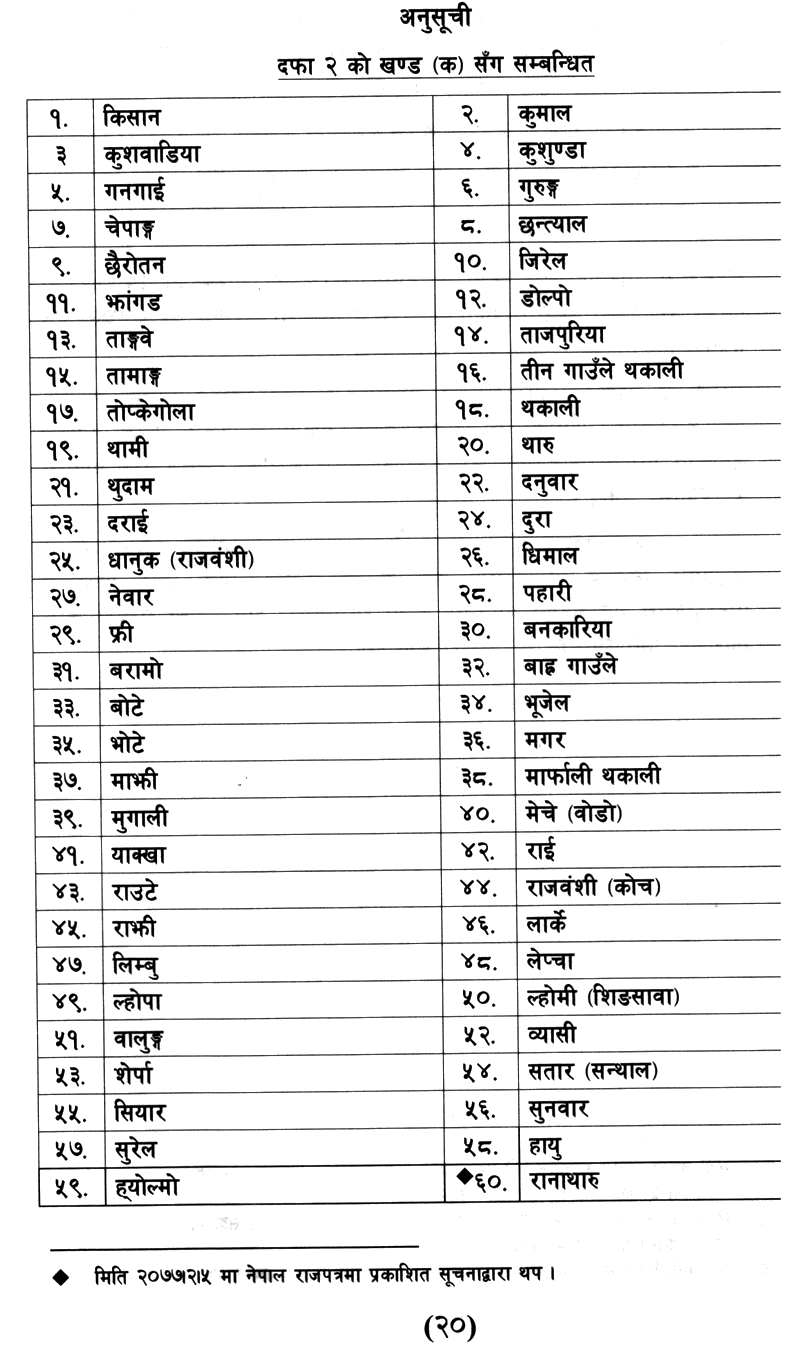Overview
The Indigenous Nationalities Commission (INC - Adivasi Janajati Aayog - आदिवासी जनजाति आयोग), established by the Constitution of Nepal in 2015, serves as a crucial constitutional entity dedicated to safeguarding the rights and interests of Indigenous communities. This body, operational since November 13, 2018, underscores Nepal's commitment to recognizing and valuing the unique cultural heritage and rights of its Indigenous nationalities.
Formation and Legal Framework
- The INC is structured with a chairperson and up to four members, all appointed by the President of Nepal based on recommendations from the Constitutional Council.
- Governed by the Indigenous Nationalities Commission Act, 2074, the commission's roles, responsibilities, and operational guidelines are well-defined, ensuring a structured approach to addressing the needs of Indigenous communities.
Mandate and Objectives
- Research and Protection: The INC's primary function involves conducting comprehensive studies and research to protect the rights and welfare of Indigenous nationalities.
- Policy Recommendations: It plays a pivotal role in advising on policy, legal, and institutional reforms, aimed at the empowerment and development of Indigenous communities.
- Cultural Preservation: The commission is tasked with safeguarding languages, traditions, and cultural practices, ensuring the continuation of Indigenous heritage.
- Awareness and Advocacy: Through awareness programs, the INC seeks to eliminate social stigmas and exploitation, promoting a more inclusive society.
- Economic Empowerment: It focuses on developing and implementing programs to uplift economically or socially disadvantaged groups within Indigenous communities.
Operational Base
- The Secretariat of the Commission is located in Lalitpur, Pulchowk, acting as the central hub for all its activities and initiatives aimed at promoting Indigenous rights and interests.
Significance and Impact
The Indigenous Nationalities Commission symbolizes a progressive step towards inclusive governance and cultural preservation in Nepal. By advocating for the rights, traditions, and welfare of Indigenous communities, the INC not only honors Nepal's rich diversity but also plays a critical role in the nation's social and cultural development. Its efforts in policy formulation, advocacy, and empowerment are key to ensuring that Indigenous nationalities in Nepal are recognized, respected, and given equal opportunities to thrive.
List of Indigenous Nationalities
| Bankariya | Kumal | Kusunda |
|---|---|---|
| Gangai | Gurung | Chepang |
| Chhantyal | Chhairotan | Jirel |
| Jhangad | Dolpa | Tangbe |
| Tajpuriya | Tamang | Tin Gaule Thakali |
| Topkegola | Thakali | Thami |
| Tharu | Thudam | Danuwar |
| Darai | Dura | Dhanuk (Rajbanshi) |
| Dhimal | Newar | Pahari |
| Phree | Bankariya | Baramu |
| Barha Gaule | Bote | Bhujel |
| Bhote | Magar | Majhi |
| Marphali Thakali | Mugali | Meche (Wodo) |
| Yaakkha | Rai | Raute |
| Ranbanshi (Koch) | Rajhi | Larke |
| Limbu | Lepcha | Lhopa |
| Lhomi (Shigsawa) | Walung | Vyasi |
| Sherpa | Satar (Santhal) | Siyar |
| Sunwar | Surel | Hayu |
| Hyolmo | Ranatharu | Kushwadiya |
Classification of Indigenous Nationalities
|
Endangered |
Bankariya, Hayu, Kisan, Kusbadiya, Kusunda, Lepcha, Meche, Raji, Raute, Surel |
10 |
|
Highly Marginalized |
Bote, Baramu, Chepang, Danuwar, Dhanuk, Jhagar, Majhi, Santhal, Shiyar, Shingsawa, Thami, Thudam |
12 |
|
Marginalized |
Bhote, Bhujel, Darai, Dhimal, Dolpo, Dura, Gangai, Kumal, Larke, Lhopa, Mugal, Pahari, Phree, Rajbansi, Sunuwar, Tajpuriya, Tamang, Tharu, Topkegola, Walung, Rana Tharu |
21 |
|
Disadvantaged |
Baragaule Thakali, Byansi, Chhantyal, Chhairotan, Gurung, Jirel, Limbu, Magar, Marphali Thakali, Rai, Sherpa, Tangbe, Tingaule Thakali, Yakkha, Yolmo |
15 |
|
Advanced |
Thakali, Newar |




-Logo-65x65.png)
-Logo-65x65.png)

-65x65.png)




